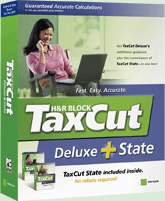|
|
H&R Block Gets Its Own Taxes Wrong!
Posted by Pile
(6125 views) |
  |
 The Kansas City, Mo.-based company said it will restate results for fiscal years 2004 and 2005, plus previous 2006 quarters, mainly because of errors in calculating its state effective income tax rate. The mistakes resulted in H&R Block understating its state income tax liability by about $32 million as of the end of April, 2005, the company added. The Kansas City, Mo.-based company said it will restate results for fiscal years 2004 and 2005, plus previous 2006 quarters, mainly because of errors in calculating its state effective income tax rate. The mistakes resulted in H&R Block understating its state income tax liability by about $32 million as of the end of April, 2005, the company added.To make matters worse, the discrepancy stems from a bunch of legal trouble the company is in over what some are claiming are unethical marketing and loan operations. | |
Results for the latest quarter were cut by an after-tax charge of $31.7 million, or 10 cents a share, to cover the cost of a previously announced legal settlement, the company explained. H&R Block was expected to earn 26 cents a share during the period, according to the average estimate of seven analysts in a Thomson First Call survey. H&R Block's $31.7 million charge stems from the settlement of four state class-action lawsuits related to "refund anticipation loans," short-term cash advances made against customers' anticipated income-tax refunds. In return for the loans, customers agree to give a percentage of their tax refunds to H&R Block and the bank it works with. The annual interest rates on these types of loans often work out to be as high as 40% to 700% a year, according to the Center for Responsible Lending, part of community lending organization The Center for Community Self Help. H&R Block's settlement, which was announced in December, includes more than 8 million customers. But that hasn't got the company out of all its legal tangles. California State Attorney General Bill Lockyer sued H&R Block on Feb. 15 claiming the company has violated 15 state and federal laws by selling high-cost refund anticipation loans mainly to poor families. When marketing the loans, H&R Block failed to adequately inform customers they can keep more of their income throughout the year and not have to wait for a refund at tax time, the suit claimed. Lockyer's suit also alleged that H&R Block advertisements were deceptive, portraying the loans as a "refund" or "instant money." | |
Details | |
| 1 Article displayed. |


 Bumper Sticker Store
Bumper Sticker Store



